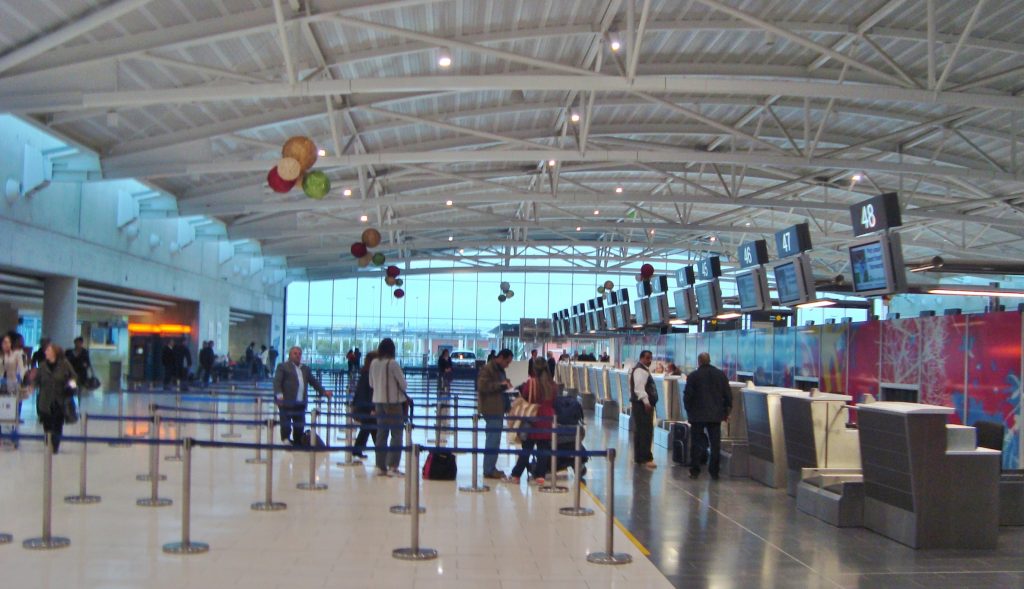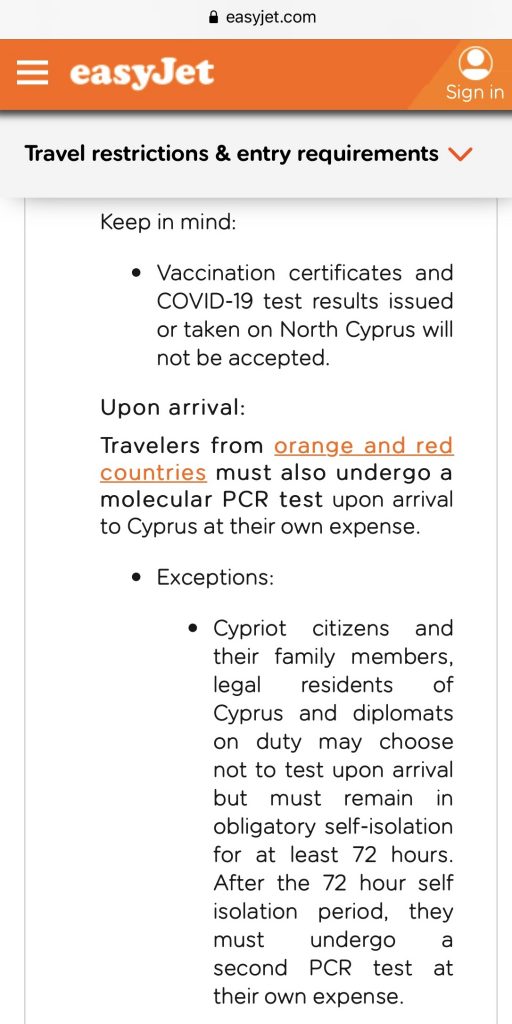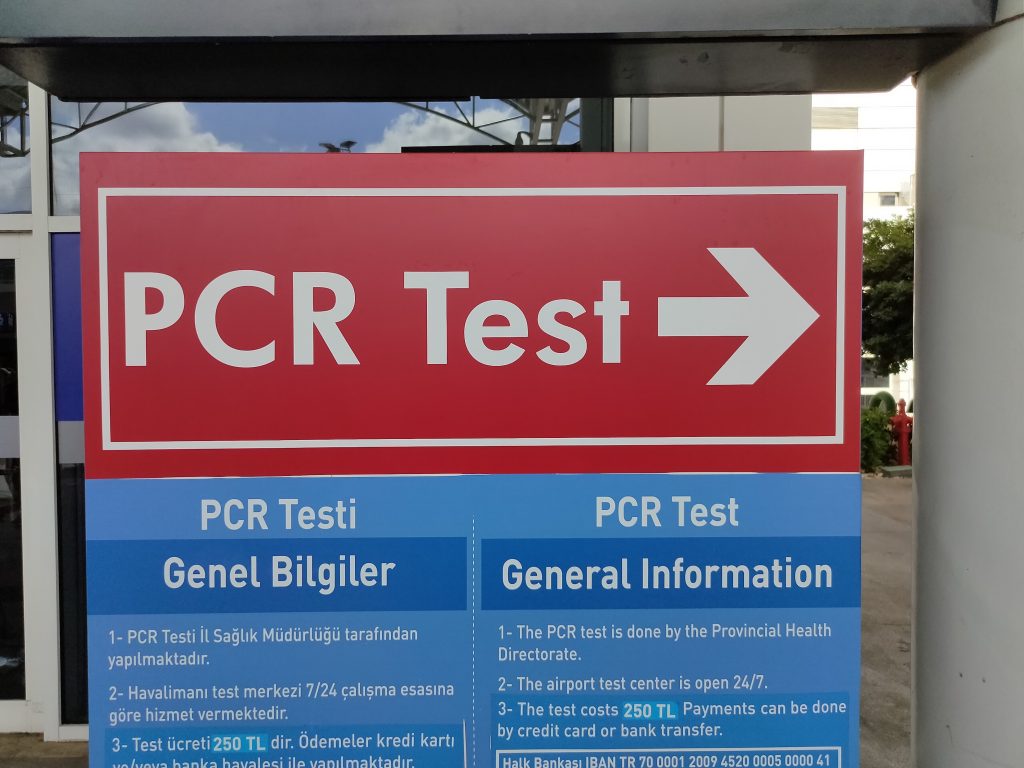For the past three weeks, travellers from North Cyprus leaving the island via an airport in the south have faced nervous trips across the Green Line border, unsure whether their PCR tests will be accepted at Larnaca and Paphos Airports.
Dozens have been randomly turned away by airport officials when trying to check-in, prompting accusations of discrimination and possible breaches of EU law.
Conflicting information from fellow passengers, Greek Cypriot officials and airlines about a ban on PCR tests from the Turkish Republic of North Cyprus (TRNC) have all added to the confusion.
While the vast majority of passengers report sailing through check-in and boarding their flights without any problems, there are no shortage of personal stories from those whose North Cyprus PCR tests were rejected.
There have been tears, screams, and at least one major “scene” involving around 60 passengers who were initially denied permission to board UK-bound aircraft at Larnaca Airport until they had new antigen tests in South Cyprus.
The incidents have led to plenty of protests and complaints, as well as enquiries to multiple airlines from scores of anxious passengers. Yet confirmation from the Greek Cypriot authorities of an actual bar on the use of TRNC PCR tests remains elusive.
A communication from Maria Kallidou, a Press Officer at the Greek Cypriot Public Information Office (PIO) dated 11 August and circulated by the British Residents Society (BRS) to its members, is the closest to an official admission of such a ban.
In the email, which came to the BRS via the British High Commission, Ms Kallidou responds to an unidentified gentleman’s query:
“With regards to the second part of your query, PCR tests from the occupied areas [a derogatory Greek Cypriot term for North Cyprus], please be informed that such tests are not accepted for travel from the official airports/ports of the Republic, even if the tests are in English. Another PCR test will have to be carried out at the authorized labs of the Republic in each city or at the Larnaca/Pafos Airports ahead of traveling.”
Repeated attempts by T-VINE to verify if this response is official Republic of Cyprus policy failed. Pantelis Pantelides, a senior aide to President Anastasiades, told T-VINE that an announcement was “imminent”.
Ten days on and there is still no statement from the Presidential Palace, the Greek Cypriot Ministry of Health, nor the PIO. Nor have any details been published on any government websites or on the official website of Larnaca and Paphos airports, which are managed by Hermes.
Alongside the lack of publicity, the other big question is if a North Cyprus PCR test ban exists, why is it not being uniformly applied to all North Cyprus passengers flying from South Cyprus airports?
What we know so far
Globally, a polymerase chain reaction (PCR) test has become mandatory for anyone travelling abroad. The test can detect the presence of coronavirus in the body, helping to identify those infected even if they are not exhibiting any symptoms.
There is an internationally accepted standard for Covid-19 testing, which state-run and private laboratories in the TRNC also adhere to.
Since last summer, when countries re-opened for international travel, thousands of people started their worldwide journeys from North Cyprus armed with the results of a locally taken PCR test without any problem.
When the Green Line checkpoints were closed from March 2020 to June 2021 to contain the pandemic, the Greek Cypriot authorities approved the use of North Cyprus PCR tests for Turkish Cypriot workers and patients authorised to cross to the South, as well as for any foreigners in the TRNC booked onto repatriation flights. This same policy was extended to the general public when the crossings re-opened to all in June of this year.
Until three weeks ago, passengers from the TRNC would use the same PCR documents at both the Green Line crossing and at Larnaca and Paphos Airports. Suddenly, at the start of August and without any prior warning, some passengers were prevented from checking in because their North Cyprus PCR tests were deemed invalid for international travel.
Cyprus Airways message first indication about TRNC PCR ban
Initially, there was speculation on whether the rejections were the fault of the passengers. Perhaps their TRNC PCR test certificates were missing key information, such as contact details, or the identity number on the certificate was different to the person’s passport.
The theory that the ban was official gained greater weight, however, following a message from “Anastasia, a Contact Centre Agent” for Cyprus Airways, which went viral. Her response to a customer enquiry said:
“As per the latest Cyprus government decree, passengers with PCR test or vaccines certificate issued from north Cyprus are not eligible to travel.”
Whilst the vast majority of travellers continued to fly from Larnaca and Paphos with no discernible problems, Turkish Cypriot taxi drivers confirmed of having to bring back passengers to North Cyprus after they were refused boarding because of their TRNC PCR tests. Others took to online forums to describe the obstructions they faced.
One lady, Britt H. Jespersen, wrote on the popular North Cyprus Expats Uncut Version (NCEUV) Facebook group on 9 August that her husband was unable to board his flight to Qatar and ended up missing his flight because he was required to do a new PCR test in South Cyprus.
“Today my husband was supposed to travel from TRNC VIA Larnaca to Qatar. He has his vaccines. He had a negative PCR test. He had no problems crossing the check point BUT in the airport they REFUSED to accept the PCR test as it was from TRNC. They said it wasn’t a recognized country,” posted Ms Jespersen.

“He asked them if he then was illegal in the south as he passed the check point with it. They said it was not their business but they would not let him take off…
“He asked if they could show him just one paper telling that it was their business to tell if it was a valid PCR test, as it is accepted at the final destination. They answered that it was true it was not written anywhere, but they did not accept it. He had to make a new test in the south.
“Outcome: he didn’t get on the plane , but are now in a hotel. And crossing fingers that the test result comes before the morning flight. In Qatar his work are waiting. And everyone’s schedule needs to be changed,” Ms Jespersen said, signing off as, “We are EU citizens” at the end of her post.
As these types of testimonies became more common, panic started to creep in to those set to travel via South Cyprus. People began bombarding airlines with enquiries about whether North Cyprus PCR tests were valid or not, and posting the responses online.
On 9 August, Cyprus Airways did a U-turn on its North Cyprus PCR ban advice. T-VINE was sent a copy of the new message, again from customer services rep “Anastasia”:
“As per latest update by the airline, which was given kindly please disregard previous correspondence. Cyprus Airways will accept PCR tests conducted in North Cyprus.”
When T-VINE enquired about these conflicting messages, Cyprus Airways Marketing Officer Andrea Tsinikola said in a written response that:
“Cyprus Airways accepts both PCR tests and vaccination certificates for approved vaccines issued in the occupied area of the island,” adding, “The following [message from Anastasia] was an isolated incident due to a misunderstanding of current directives.”
Airlines refer to destination country’s PCR test rules
Ms. Tsinikola also provided a link to the coronavirus section of the UK Government website for those travelling to the UK, along with its Greek Cypriot equivalent for those travelling in the opposite direction.
Both websites offer guidelines on what Covid tests are required ahead of travel and for entry into the country. Neither site mentions a ban on North Cyprus PCR tests, or that only certificates from testing facilities in the Republic of Cyprus can be used at South Cyprus airports.
Cyprus Airways’ response to T-VINE was echoed by other airlines, and for Cyprus to UK travel all pointed to the UK government website for PCR rules.
A Jet2 spokesperson told us on 13 August that, “Providing the tests taken for pre-travel meet the UK government standards of testing and validity period, they would be acceptable for entry to the UK.”
British Airways (BA), EasyJet, Ryanair and WizzAir have all stated the same in their press statements and responses to concerned passengers.
Essentially, airlines and their passengers are all governed by the Covid travel requirements at the country of destination. As long as passengers adhere to these conditions, their test certificates are valid.
Panic as passengers refused flights due to TRNC PCR tests
Although the airlines’ responses were reassuring, stories of airport ground-handling staff at Larnaca and Paphos Airports rejecting North Cyprus passengers persisted.
Maxine Ryan documented her experience on NCEUV on 17 August: “Hi everyone, we are at Larnaca airport and I want to make sure everyone has this information.
“Easyjet are NOT accepting PCR from the north. We had to leave the airport in a taxi go to a pharmacy and have a lateral flow. The queue was down the road by time we left. 50 euros in taxi for him to wait for us and 24 euros for test.
“The staff were rude and dismissive of anyone from the north. Every single person who had PCR from the north was turned away. We shared a taxi with a grandmother and her grandchildren also turned away! And another family refused boarding until tomorrow, as not enough time for lateral flow. Please be aware.”
In contrast, on the same day and at the same airport, Martin Manton sailed through his check-in using his North Cyprus PCR certificate and successfully boarded his WizzAir flight.
“No problem at Pyla checkpoint, really pleasant lady at Greek side, straight into check in, no problem with Turkish PCR certificate,” Martin wrote.
Another North Cyprus resident, Shell Louise, thanked Martin, “Nice to see another positive experience, reassuring for very nervous travellers like me, thanks for sharing,” prompting Martin to respond, “It was perfectly straightforward, the check-in staff didn’t appear to care who issued the PCR, just its validity.”
Martin’s account tallied with that of Sue Petri, who wrote: “I flew Jet 2 on Sunday [15 August]. No problem with PCR test from north. Also flew into Ercan and out of Larnaca. No problem at all. Efficient and courteous.”
Alongside masses of positive stories, every few days a negative one would pop up on NCEUV from a passenger or relative about a new incident, setting alarm bells ringing again.
On 19 August, Bilgin Ahmed wrote: “My son is at Larnaca airport now. Flying with Easyjet. They want everything printed. 1. Locator form 2. 2nd day receipt of PCR test 3. Vaccine letter. 4. Greek antigen test. No Turkish PCR was accepted.
“He did is Greek antigen test a day before on the South in a chemist – cost 7 Euros. He was able to get his boarding pass, but a lot of people were turned away.”
Issy Atahasan, who runs the 10,000 strong NCEUV group with Lisa Wright that has become the definitive source of Cyprus travel information for British Turkish Cypriots and TRNC international residents, told T-VINE, “There is a kind of pattern. It is not every day. Every other day, and not all staff, but a few at each airport.”
Was the issue perhaps simply down to a few rogue and racist airport staff members, and not a petty and vindictive political move by the Greek Cypriot authorities to create mass stress and inconvenience to counter the Turkish side’s moves to open Varosha? More online debate ensued.
UK Government response to claims it is not accepting TRNC PCR tests
One common misconception that was deliberately cultivated by Greek Cypriot officials was that Britain was not accepting TRNC PCR tests, a claim that was proven to be wholly untrue.
In a written statement to T-VINE from the UK’s Department for Transport, a UK Government spokesperson said:
“We are aware of the issues that some passengers have had with pre-departure tests from the north of Cyprus and continue to seek clarity on the position from the Cypriot Government. Our Travel Advice will be updated if required to reflect any official advice we receive.
“Passengers returning to the UK must continue to present proof of a pre-departure test ahead of travel, and we continue to advise passengers to check the rules with their airline beforehand.”
After being contacted by T-VINE about the ongoing problems at Larnaca Airport, including the chaotic scenes on 19 August, the UK Government updated the travel advice for Cyprus. Under ‘Returning to the UK’ header in the ‘Coronavirus’ section, a newly inserted paragraph reads:
“The British High Commission is aware of issues that some passengers have had with airlines not accepting pre-departure COVID PCR test certificates from the north of Cyprus and is seeking clarification from the Republic of Cyprus. We advise all travellers with questions or concerns about pre-departure testing to seek advice directly from their airline well ahead of travel.”
Clearly, not only had the UK authorities not banned North Cyprus PCR tests, they were not even aware a ban existed. Yet Greek Cypriot officials were quite happy to tell UK-bound passengers the issue lay with Britain.
As anyone consulting the UK Government online travel advice for Covid will see, Britain does not have country-specific PCR rules. The test must meet certain conditions and if it does, the country of origin and its international status is irrelevant.
The UK’s PCR criteria includes a person doing their test “in the 3 days before the service on which you will arrive in England departs”. The PCR test must be carried out by a “private test provider” and the results to be in English.
Britain accepts different Covid-19 tests, including a PCR , LAMP, or antigen test, such as lateral flow, which are all valid as long as they “meet performance standards of ≥97% specificity, ≥80% sensitivity at viral loads above 100,000 copies/ml.”
With the UK Government ruled out as the source of the problem, the focus shifted elsewhere.
Bizarre EasyJet notice: TRNC PCR ban applied to UK-to-Cyprus flights
The saga took a fresh twist with the appearance of a notice about the North Cyprus PCR ban on the website of EasyJet – one of the most popular airlines for travel between Britain and Cyprus.
The details were located on EasyJet’s Coronavirus Travel Hub section: “Vaccination certificates and COVID-19 test results issued or taken on North Cyprus will not be accepted.”
Bizarrely, the notice only appeared under the Covid-19 section of flights from the UK to Cyprus, which was either missed by North Cyprus passengers looking for PCR requirements in the other direction, or baffled everyone. After all, no one about to travel from the UK would have need for a PCR test from a North Cyprus lab.
Was it a mistake by EasyJet? Initially that was the view, but as it emerged that airlines are governed by Covid-19 rules at the country of destination, a new understanding dawned.
The Greek Cypriot government had indeed issued such a directive and the airline duly obliged by uploading it to the only area it could – the PCR entry criteria for passengers flying to Cyprus.
The notice has now been removed and this week the airline has been at pains to state PCR tests from across the island are accepted. The damage to EasyJet’s reputation, dubbed “#racistJet” by some, however, is already done.
Chaos at Larnaca Airport when 60 TRNC passengers refused boarding
Things came to a head on Thursday evening, 19 August, when dozens of TRNC origin travellers due fly with EasyJet, WizzAir, and Jet2 were denied passage.
Sevko Koz wrote on NCEUV, “I am currently on the Wizz air flight to London Luton. Wizz air Check’in staff are not allowing people to check in with PCR tests which have been done in north Cyprus. A lot of people were refused. I was lucky I came early and done a rapid test yesterday at Larnaca Airport.”
As chaos ensued, the passengers refused to co-operate and demanded they be allowed to fly. The collective pressure worked, as the Greek Cypriot officials caved in, letting all board, but with a warning that in future their TRNC PCR test results would not be accepted.
One Turkish Cypriot taxi driver, Melih Özhakkı, who had dropped passengers off at the airport that evening, captured the evening’s events with a post in Turkish on his Facebook page:
“Once again it shows the despicable behaviour of staff at Larnaca airport. This evening on the Jet 2 flight, 16 people were not allowed on the plane due to having TRNC PCRs. On the 21.55 Wizz Air flight, around 40 people were refused boarding onto the plane, so the passengers caused a scene.
“Because of the large number of both local [Turkish Cypriot] and foreign passengers, the airline authorities said they would permit this just this once and allowed everyone to board.
“In short, it looks like there will be all sorts of problems created with PCRs from the TRNC on Larnaca and Paphos flights. Precautions should be taken by everyone,” Mr Özhakkı added.
Two Italian families experience the absurdity of the TRNC PCR ban
The absurdities of the situation were perhaps most keenly felt by two Italian families booked to fly back to Rome from Larnaca Airport with WizzAir, also on 19 August.
The families were guests of TRNC-based travel agent Ornella Spadola Demiral, and had done the same trip many times. For the past year, they had used TRNC PCR tests for their return travel without any difficulty.

Demiral described to T-VINE what happened at the airport: “On Thursday, my friends who had done their PCR tests in North Cyprus, had a lot of problems at Larnaca Airport. Both families passed through the Green Line border without any issues. When they arrived at the airport they lined up in two different check-in queues for their WizzAir flight to Rome.
“One of the families was checked-in with their TRNC PCR tests, while the second family in the other queue was told, ‘The TRNC is not recognised, so your PCRs are not valid here’. The gentleman advised the family to quickly take a rapid test, else they would not be allowed to board.”
“The second family got their antigen test at the entrance of the airport. They were really angry and screamed down the phone at me why I didn’t tell them about this [requirement], but there is no official information about this ban anywhere. How was I supposed to know?
“Once they did the antigen test, the second family was allowed to check-in. Afterwards, they went to departures, where they met the first family.
“When they all went to the boarding lounge, they noticed the guy who had refused the second family was again checking the tickets and Covid travel documents. When the first family showed him theirs, he refused to let them pass.
“He told them, ‘We don’t accept your TRNC [PCR] tests. You need to make a rapid test and if you have time, you’ll board’.”
“The family was forced to run, and get the tests done. Thank God they just made it and were allowed to board. It was a horrible situation,” Ms Demiral explained.
Her guests, all EU citizens, went to see Larnaca Airport’s head of police, who rejected their complaint, telling them: “From now on, we will not accept the PCRs from the North. Our government has already informed the North Cyprus authorities about it, so I don’t care if you flew last month, but today you can’t because the law has changed.”
Ms Demiral and her guests have made complaints to WizzAir, the Italian Embassy in Nicosia, and also to the EU Commission.
Are airport ground handlers to blame for PCR test discrimination?
T-VINE asked airport operator Hermes for comment about these incidents and what the official policy on TRNC PCR tests is. Although they didn’t answer our questions, their press team did send us this statement:
“Please note that Hermes Airports as the operator of Larnaka and Pafos airports doesn’t dictate or decide on any Health Protocols or Covid-19 related State decisions. Moreover, we don’t interfere, nor it is our responsibility to do so, with the policies that each airline operator will implement (meaning which documents will accept or health requirements etc.).”
Hermes also asked us to also bear in mind that check-in is done by ground handlers of airlines, and yet the airlines have repeatedly made it clear that they all accept TRNC PCR tests.
Have consumer rights been breached?
So who is responsible for this discrimination of North Cyprus passengers, and are they liable for the losses incurred by those who were made to get new tests and even miss their flights?

The Republic of Cyprus is a part of the European Union, which enshrines in law significant rights for consumers and businesses. The Greek Cypriot authorities, the airlines and their local operatives, and the airports are all bound by these EU laws.
Ergin Balli, head of BY Law, which specialises in international commercial and cross-border law, believes passenger consumer rights and those of the TRNC labs have been breached.
He points to the lack of publicity about the North PCR ban, the arbitrary manner in which it was applied, and the losses incurred by both passengers and North Cyprus testing facilities bypassed for those in the South, and argues these actions amount to discrimination.
“The EU has a comprehensive body of law that offers a high level of protection for consumers and small businesses. There are specific EU directives that give consumers the right to information before they purchase something in the EU, as well as protection from unfair contract terms and commercial practices. A passenger who has consulted the websites of their airline, the airport and government and found no information about a PCR ban from North Cyprus cannot suddenly be penalised for it.”
“Private labs in the TRNC could also have a case, given a ban on their tests will negatively impact their business. If these tests are good enough to be used at the Green Line checkpoints and internationally, as governments including Britain, Israel and Italy all accept them, it’s illogical and highly discriminatory that these same documents can’t be used at Larnaca and Paphos airports, ” Balli added.
The London-based lawyer, who has a successful track record of challenging discrimination against North Cyprus, including overturning the Transport for London North Cyprus tourism ad ban in 2005, advised passengers who were adversely affected to contact an EU consumer law specialist.




